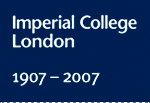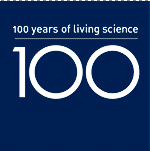Professor Stephen Landor and Dr Phyllis Landor
(Chemistry PhD, 1951; Chemistry PhD, 1951)
share their experiences of Chemistry at Imperial
Phyllis Landor It all started because we got called up for the war effort but instead of being called up for the war effort, we went to ICI Plastics in Wellyn Garden City.
Stephen Landor Well it was the war effort.
PL Yes, they called it ‘reserved occupation’. I was supposed to be going to Cambridge, but I couldn’t go, I got called up, the same as Stephen, so we met there and we got to know one another, and we were married before we came here.
SL Working at the same laboratory.
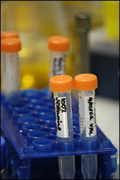 PL That’s how it happened, we were working in a research laboratory at ICI, after school, so to speak, because we got called up. We had no choice, you either went in the forces, or you go in reserved occupation…
PL That’s how it happened, we were working in a research laboratory at ICI, after school, so to speak, because we got called up. We had no choice, you either went in the forces, or you go in reserved occupation…
Interviewer: Is this the first time you’ve been back to Imperial since you left?
SL Oh no. We’ve been back lots of times.
PL Yes we’ve been back for lectures and things in the past but after we got our PhDs we went to Manchester University, which was our first appointment.
SL Appointments.
PL Appointments, yes, both of us, yes. And after that we went off to Africa, seeing we had a fellowship in West Africa and then after that, what happened then? Did we come back for a bit to Exeter?
SL We came back to Exeter.
PL Back to Exeter yes. Our old was a professor here at Imperial College so went back to Exeter and then we went overseas again to East Africa, and got involved in all the Amin business, which you probably have heard about. Amin’s dictatorship, has anyone seen the film that was on about Amin and Uganda and that? No, well anyway we got involved in all that. So we left again, went back to Exeter and then retired from there, and that’s where we live now. That’s our story.
SL Well, we didn’t retire from chemistry, but never mind.
PL Well you went on a bit longer than I did.
Interviewer: And so you have been back to Imperial on occasions throughout the years…?
PL Not for the Alumni. For lectures.
Interviewer: Presumably you’ve seen quite a bit of change from when you first arrived here to the present day?
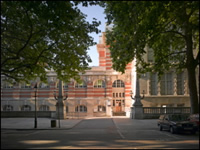 PL Well, we've just been around the chemistry department so I think we are both a bit surprised. I thought it would have been completely modernised. I expected the whole thing to be a new building totally, but there are remnants of the laboratory where we used to work still, and the old staircases and the lifts are pretty ancient too. But there are obviously lots of improvements in the way the students are working. We didn’t have private fume cupboards then and we didn’t have to wear goggles in the lab, which…
PL Well, we've just been around the chemistry department so I think we are both a bit surprised. I thought it would have been completely modernised. I expected the whole thing to be a new building totally, but there are remnants of the laboratory where we used to work still, and the old staircases and the lifts are pretty ancient too. But there are obviously lots of improvements in the way the students are working. We didn’t have private fume cupboards then and we didn’t have to wear goggles in the lab, which…
SL The fume cupboards, sometimes they exploded.
PL Yeah, but not each bench having their own fume cupboard for chemistry. Another story that you might like to put on is Stephen making – you want to tell us about your molecular sodium, you were making molecular sodium.
SL Didn’t have any story to it.
PL Well, it all blew up!
Interviewer: Tell us about your experience, it sounds very interesting.
PL Yes, tell us about it.
SL Well, like I say, it wasn’t particularly different.
PL You were shaking it when…
SL Shook it up, very small globules out of it, and then you used it for whatever experiments…
PL Although you didn’t get that far.
SL Yes I did.
PL It blew up in your face.
SL One of them blew up.
PL I was there, I know. It was in the evening. One of them blew up and he had to go to St George’s hospital, which was just down the road in those days. He had to spend a week in the hospital, didn’t you?
SL That’s right.
PL As you see, he has recovered, it hasn’t affected him permanently. But that was about the most exciting thing, wasn’t it, that happened.
SL Well, yes, it wasn’t very pleasant, but…
PL I shouldn’t think it was, you seem to deny and deny all the time, oh dear.
PL I think people worked very, very hard, in our day.
SL Yes very, very hard.
PL And we were surprised that no students worked that Sunday, no students working in the chemistry department. In our day, people would be working all the time. A funny thing…
SL Start at eight o’clock in the morning, or seven o'clock in the morning…
PL You would set up your apparatus the night before and go home, because we were short of apparatus like pumps and things, and you set it all up, ready to come in the morning, and some would be there even earlier than you, whipped off your pump and started work. People were very hard working then, in chemistry.
SL Very hard working indeed. Much harder working than now.
PL Well, we don’t know what they do now, that would be unfair to say that. Certainly there would always be people there early in the morning and late at night.
Filming by Barbara Axt Portella.
© 2007 Imperial College London
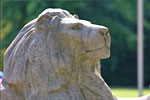
Through the first decade of the twenty-first century the campaign seeks to philanthropically raise £207 million from Imperial’s alumni, staff and friends, and donations from charitable foundations and industry.
Where your support can make a differenceGive now
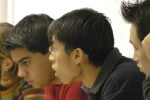
Imperial’s Centenary Year provides an opportunity to recognise and celebrate members of the Imperial community.
View staff and student portraits